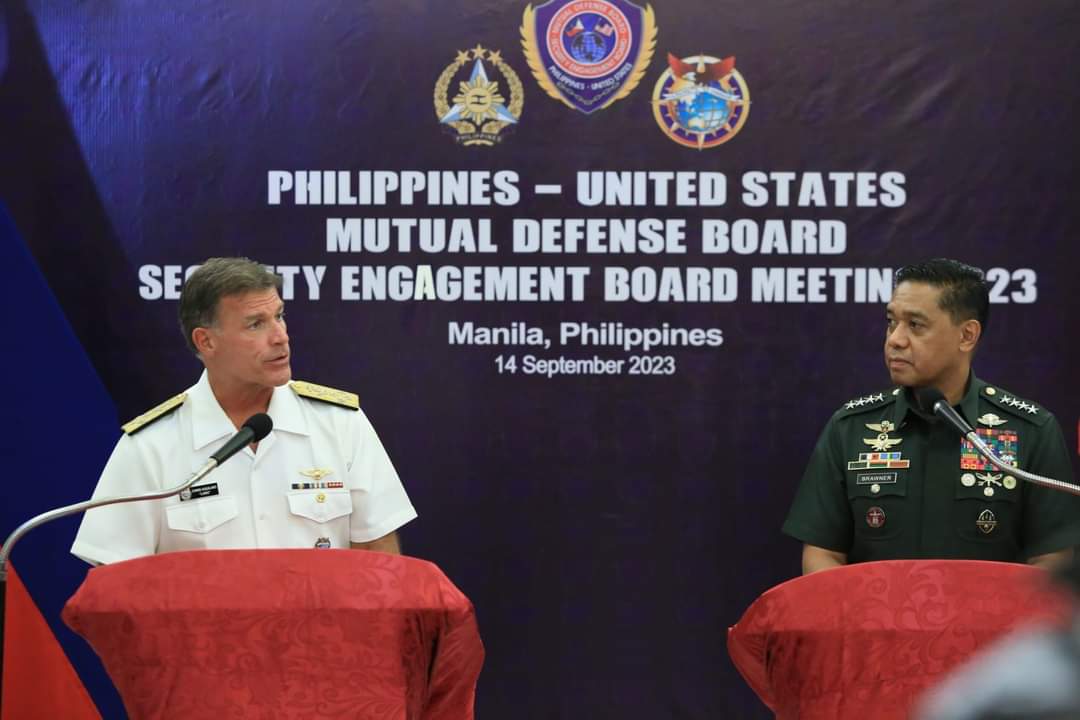PH, US to collaborate in 500 military activities in 2024

More than 500 bilateral engagements between the Armed Forces of the Philippines (AFP) and United States Armed Forces will be carried out in 2024 including large-scale exercises, joint patrols, and Enhanced Defense Cooperation Agreement (EDCA) projects among others.
This was agreed upon by AFP Chief Gen. Romeo Brawner Jr. and Admiral John Aquilino, commander of US Indo-Pacific Command, during the conclusion of the annual Mutual Defense Board-Security Engagement Board (MDB-SEB) meeting at Camp Aguinaldo in Quezon City last Sept. 14.
The number of engagements between the two militaries next year was bigger compared to the 496 activities set this 2023.
“The meeting is the culminating activity of the PH-US planning cycle that assessed previous activities and set out over 500 bilateral engagements for 2024 to include exercises and high-level exchanges between the allied nations, matters of security cooperation activities, and the strategic vision including maritime security, information sharing, and capacity and capability development, among others,” Lt. Col. Enrico Gil Ileto, chief of AFP public affairs office, said on Saturday, Sept. 16.
“Ang very significant lang ngayon siyempre ‘yung EDCA projects tapos ‘yung siyempre this time may interest sa joint exercises ‘di ba and magkakaroon ng inclusion ngayon ng mga key international partners and other countries (What’s very significant now are the EDCA projects, then there is an interest in the conduct of joint exercises, and the inclusion of key international partners and other countries),” he added.
During the MDB-SEB meeting, Brawner and Aquilino agreed to expedite the completion of 63 additional EDCA projects on top of the 32 projects allocated earlier.
There are nine EDCA sites established in the Philippines.
Five of them are original sites that were identified when the agreement was signed in 2014 and these are located at Fort Magsaysay in Nueva Ecija; Antonio Bautista Air Base in Palawan, Basa Air Base in Pampanga; Lumbia Airport in Cagayan de Oro; and Benito Ebuen Air Base in Mactan, Cebu.
Meanwhile, four additional sites were established earlier this year as part of efforts to expedite the implementation of the agreement. These are the Naval Base Camilo Osias in Sta. Ana, Cagayan; Lal-lo Airport in Lal-lo, Cagayan; Camp Melchor dela Cruz in Gamu, Isabela; and Balabac Island in Palawan.
Development projects are being funded by the US government at the EDCA sites so these can be used optimally by both Filipino and American troops in various ways such as disaster response, security operations, and military exercises.
The projects include the construction of humanitarian assistance and disaster response (HADR) warehouse and hangar with electrical and water facilities; billeting facilities, mess hall, and barracks for the military personnel; command and control (C2) fusion system; pier with water supply; as well as rehabilitation of runways.
Meanwhile, there are various military exercises being conducted annually between the AFP and US Armed Forces, most prominent of which is the Balikatan exercises.
Both militaries have also expressed interest in conducting joint patrols in the South China Sea, including the West Philippine Sea (WPS), amid the continued aggression of China.
Just last Sept. 4, the Philippine Navy and US Navy sailed together in the WPS, and Aquilino said this will be followed by similar joint sails.
"We'll continue to do that for a long term, ultimately to ensure that we can maintain the freedom of the seas, freedom of airspace so that all the nations in the region can enjoy peace and prosperity," he said.
All of these efforts reaffirm the “steadfast commitment” of both countries in safeguarding their nations and the Indo-Pacific region, Brawner said.
“These underscore the continued partnership and collaboration between the Philippines and the United States in enhancing national defense capabilities, as well as the shared commitment to regional security and disaster response efforts. It signifies our commitment to further strengthen our cooperation, ensuring that both militaries are equipped and well-prepared to respond to evolving security challenges,” he noted.